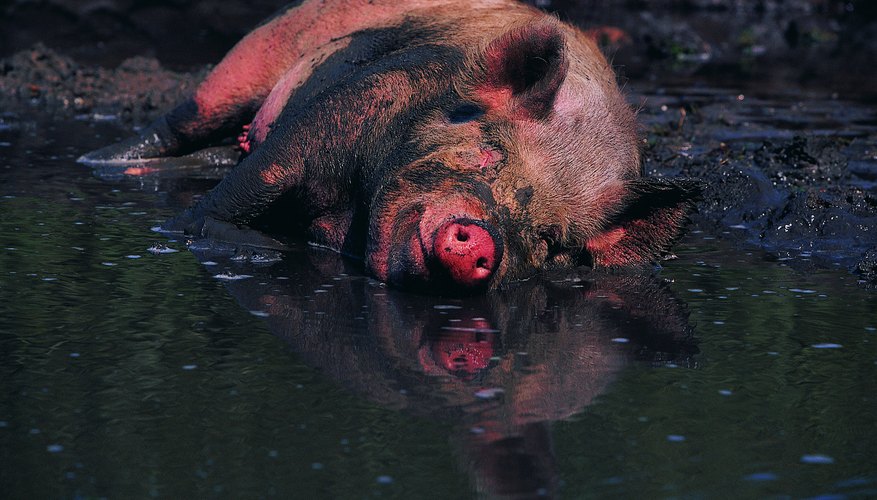
Raising pigs requires the right housing, diet and health care. Compared with other livestock, hogs are low-maintenance livestock. They do well on rougher feed and pasture, and the can thrive in smaller spaces. As long as they have food consistently available throughout the day, a three-sided shelter from the elements and basic veterinary attention, pigs will grow rapidly.
Raising Piglets
Newborn piglets need a temperature of around 95 degrees Fahrenheit for a week. Then the temperature should come down by 5 degrees each week until it is time for weaning. Young piglets must also be allowed to either root in the soil or receive an iron supplement.
Growing piglets should be offered creep feed until they are fully weaned. If you offer them pasture as well, provide only the most nutritious available pasture to encourage growth, since their stomachs are not yet developed enough for rougher or less nutritious fare.
Proper Housing
If you're raising pigs on a pasture, they will need only a covered three-sided shelter large enough for them all to lie down beside each other inside. A board fence around the pasture with a single strand of electrified perimeter wire will be enough to keep pigs contained.
You can raise pigs in a pen exclusively inside a barn, but the enclosure will need deep bedding to allow for rooting, and it will need frequent cleaning to help prevent disease. Whether indoors or outdoors, piglets will need 16 square feet of space each, while weaners and older pigs require closer to 40 square feet.
If the winter temperatures in your area drop much below 60 degrees Fahrenheit, you will need to offer supplemental heating, such as a heat lamp or heated floor mat.
In the summer your pigs will need a wallow, an area with mud and water, in order to keep cool. If you don't provide one yourself, your pigs may dig their own.
Food and Water
For optimal growth, offer pigs a high-quality commercial hog feed that will allow them to put on weight rapidly.
If you are less concerned with rapid production, pigs can benefit from a wide variety of feed types including pasture, wooded lots, scrap vegetables, whey, other dairy and day old bread, all of which can reduce their need for grain. The food you offer your pigs can affect the taste of their meat, however, so you may want to consult a nutritionist.
Clean water should be available at all times. Automatic waterers, whether they're serviced by a hose or a large drum of water, are good choices since they are difficult to overturn or soil.
Health Care
Providing your pigs the vaccines recommended for your local area by a veterinarian, and limiting the pigs' contact with other animals, will go a long way toward preventing disease. It is also crucial to keep their housing area clean and free of moisture and manure.
Pigs are often prone to worm infections, especially if they are not rotated through different pastures. Many worm species leave eggs or larvae in the host animals' feces, and rotating to a new pasture helps to disrupt ,the worms' life cycles. If your pigs do get worms, use a commercial dewormer and feed your pigs fresh garlic to help eliminate the infection. Your veterinarian may administer a tablespoon of wormwood powder per 25 pounds of pig.


